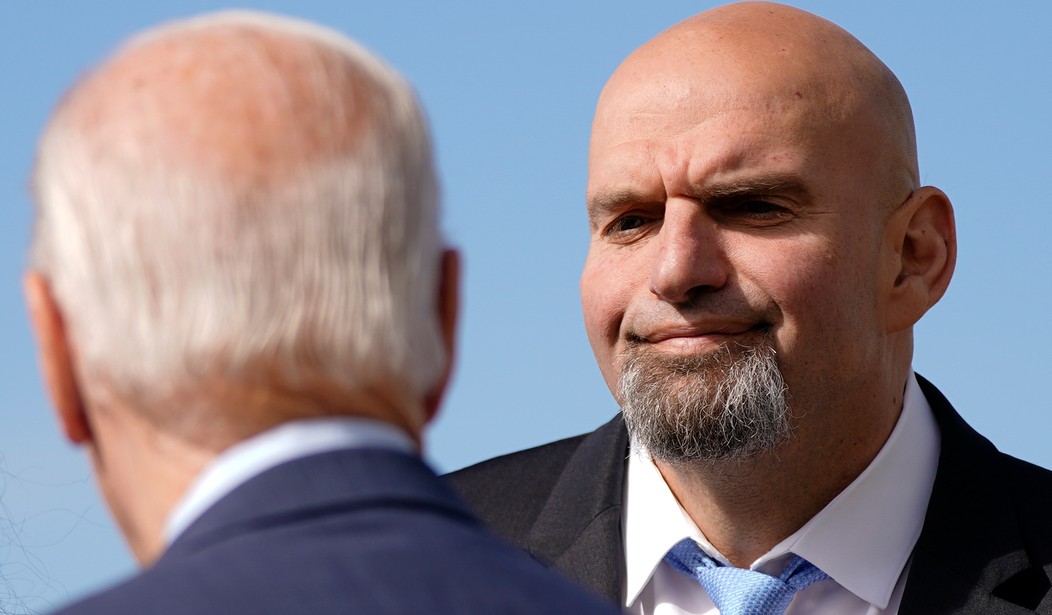I don’t watch TV news, so I couldn’t tell you what Sean Hannity or Tucker Carlson have said about John Fetterman’s checking himself into a hospital for depression.
But I was struck by an insane essay in The Atlantic about Fetterman’s fitness to serve in the US Senate. The author, Jennifer Senior, argued that Fetterman’s openness about his depression marks a turning point in society’s acceptance of the frailties of public figures, and that people arguing that Senator Fetterman is not physically or mentally fit enough to serve just haven’t come to grips with the fact that politicians and other public figures are under enormous pressures to perform and therefor should be cut more slack than others.
This strikes me as an odd take, even cruel to people for whom stressful situations are beyond their capacity to endure.
It’s not that being physically or mentally unwell is shameful and should be hidden; neither is shameful, but rather facts of life for many of us, and if we are lucky enough to live a long life there will likely come a point beyond which we can’t perform optimally. It is a cruel fact of life.
“Fetterman has basically been forced to contend with the effects of a severe brain trauma while working an absurdly demanding job in one of the most polarized and toxic political climates the country has ever known.” — @JenSeniorNY:https://t.co/57sey4ucfi
— Jeffrey Goldberg (@JeffreyGoldberg) February 18, 2023
My own experience with high-performing politicians has taught me that one of the most important qualities necessary for success is extraordinary stamina; time and again I have marveled at the stamina of candidates for whom I have worked. Even in my 30s I couldn’t bear their schedules and would have cracked under the pressure. Each of us has different skills and capabilities, which is why there is a division of labor.
Each of the points made by Senior confirms what most of us knew during the campaign: Fetterman had no business running for Senate after his stroke, and even more importantly Fetterman’s wife, friends, and handlers had no business egging him on to do so. It was cruel and irresponsible. His doctor, most of all, should be stripped of his credentials.
But I would like to focus on another aspect of this chapter in Fetterman’s life. As a national figure, Fetterman was continuously, relentlessly obligated to perform a certain role—that of a competent, confident politician. More than that, possibly: an accessible, obliging politician. The post–January 6 tightening of security notwithstanding, Congress remains one of the most open, porous environments in the country. It’s a place where reporters roam with almost unconstrained access, corralling senators in hallways, committee rooms, the elevator bank just off the Senate floor. Tourists and visiting constituents and lobbyists buzz about.
As a senator, you can never not be on, in other words. Your life is an Ironman Triathlon of outward-facing obligations: constituent sit-downs, committee meetings, caucus lunches, votes on the floor, home-state parades and fairs and school visits and town halls and barbecues where you’re asked to don a puffy chef’s hat.
Yes. A thousand times yes. Rather than arguing, as does Senior, that we should reduce the workload and accommodate the mental and physical frailties of individuals in public life, people who aspire to public life should be fully informed of what the job requires and be given the straight scoop from others regarding whether they are up to the job. Few people are, to be honest. It may not look too taxing, but it is.
This sort of evaluation is hardly unique to politicians; it is required for a wide variety of jobs, depending upon the requirements. We don’t accommodate the frailties of potential astronauts; we weed out the people for whom the work is not suited. Even the most mundane jobs ask whether you can lift certain amounts of weight, and what accommodations might be necessary in order to ensure a good fit between the job and the person.
It is said that he was unhappy that he missed out on (and still hasn’t gotten) the time he needed to properly recover from his stroke. And now here he is, in one of the most public-facing jobs imaginable—possibly even more so than the presidency, where you have the luxury of retreating into the antiqued seclusion of the White House, away from reporters and constituents.
On top of this, Fetterman was spending his weekdays alone, apart from his wife and three children, who are still in Braddock, Pennsylvania. For most of the week, he doesn’t have his loved ones by his side, the people with whom he could safely pull off the mask. Instead, he had to perform all day long, then return to an empty home.
The people pointing out how taxing and often lonely the job of Senator can be both before and after the election may have been too blunt or even cruel at times, but the people who put him in this position were far far crueler to Fetterman than anybody who made a crude joke about his mental capacities.
Fetterman’s ambitious wife, his greedy consultants, and the politicos who used him as an empty suit to win a Senate seat literally put him in the hospital for depression, which is a debilitating and life threatening condition. They deprived him of the necessary time to heal, caused permanent damage during the time he needed to heal, and subjected him to public humiliation. For their own selfish reasons.
Illness, too, can be cruelly isolating. Fetterman was trying valiantly to adapt to a demanding, high-intensity job with closed-captioning at his desk and audio-to-text transcriptions of committee hearings; he carries a tablet that converts what his colleagues say into text. This technological wizardry might make his work easier to do, but it also sets him apart, accentuating how different his lot is from everyone else’s. I’m guessing it isn’t easy to experience this difference during every interaction he has—not when his condition is so new, not when he hasn’t had ample time to adjust.
Fetterman has basically been forced to contend with the effects of a severe brain trauma while working an absurdly demanding job in one of the most polarized and toxic political climates the country has ever known.
In the coming weeks or months, my suspicion is that most of his Democratic colleagues will be supportive of Fetterman, while the hooligans at Fox and in the even-further-right precincts of the Trump underworld will say that he’s unfit to serve. It’s possible, though, that some of his most ardent supporters will quietly wonder the same. And maybe the demands of the Senate will prove to be too much for him. But Fetterman was handily elected by Pennsylvanians, who knew quite well they were electing a man who had suffered a life-altering upset to his health. Now the question is whether they’ll allow him to acclimate on his own timetable and terms. And that may be the next test of how far we’ve come as a nation in thinking about mental, physical, and spiritual health.
Senior, too, adopts a cruel attitude toward Fetterman, while claiming that compassion dictates that we embrace Fetterman’s disability as a sign of “how far we’ve come as a nation in thinking about mental, physical, and spiritual health.”
This strikes me as bizarre. After spending paragraph after paragraph outlining how Fetterman is not suited to the job, she concludes by arguing that compassion dictates we embrace his being in the Senate nonetheless.
Fetterman as a symbol is more important than Fetterman the man. To me this shows how far away from common humanity the people who used and are using Fetterman for their own purposes have traveled.





















Discussion about this post